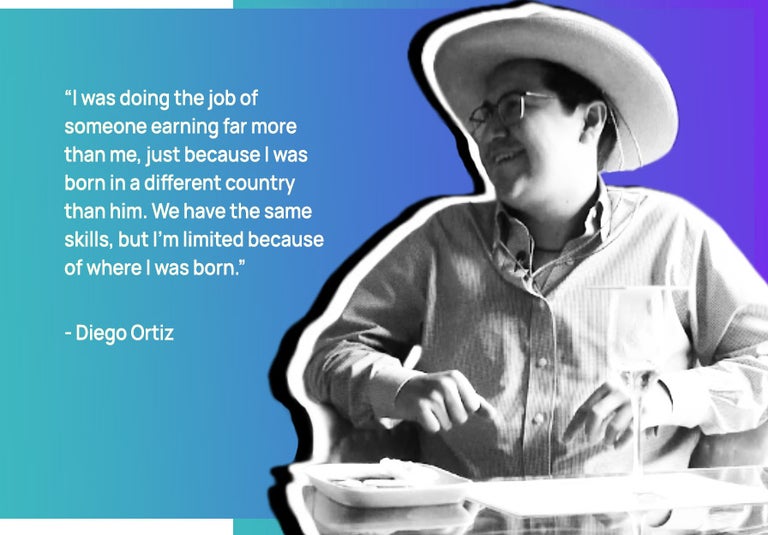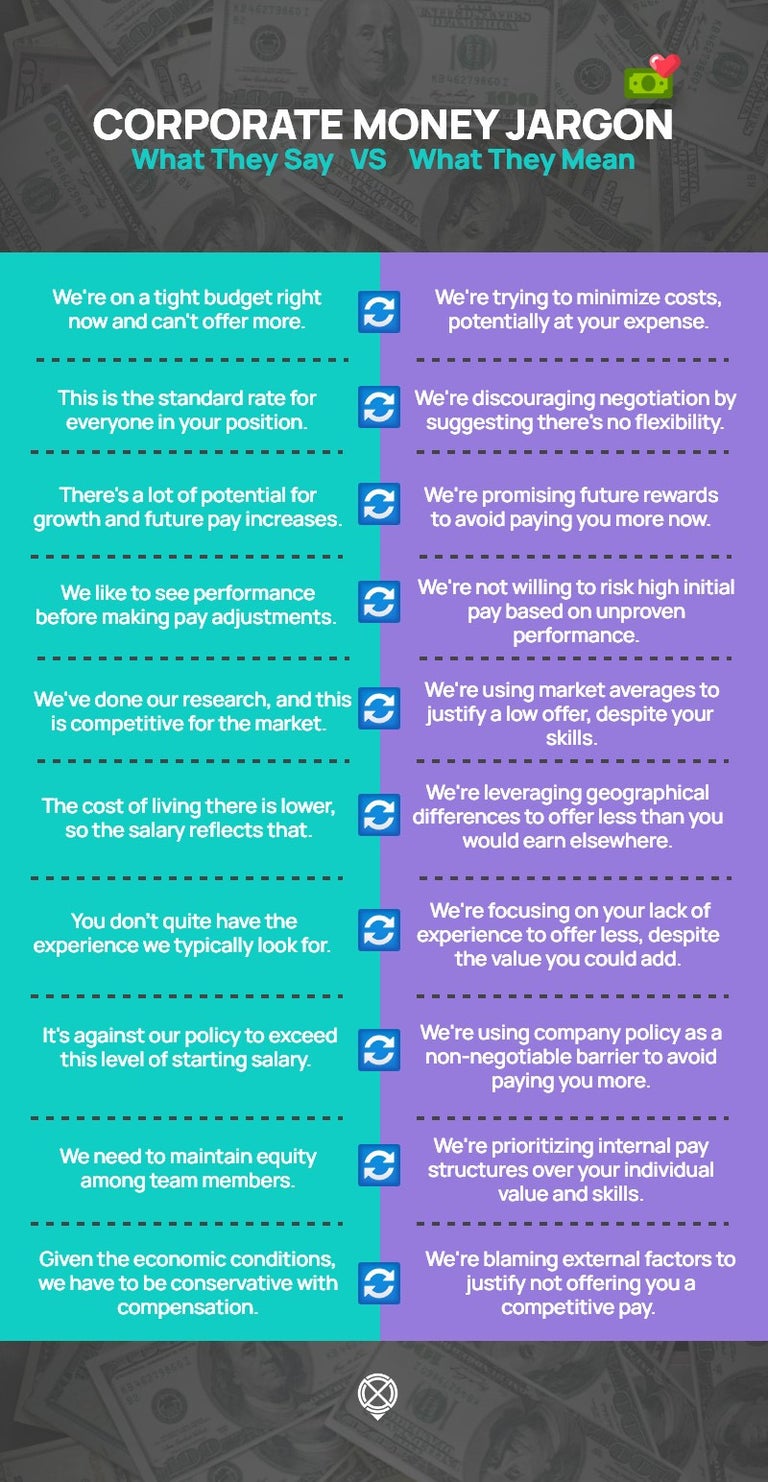Contents
- Not Getting Paid What You’re Worth: Diego’s Story
- What Happens When You Undervalue Yourself?
- Why You Don’t Quit Your US Job That Underpays You
- Negotiating With Yourself: The Language of Money
- Getting Paid What You’re Worth: The Secret
Doing the same job as your US colleagues? Then you should earn the same money. This shouldn’t be a controversial opinion, but that’s what it is. For decades, companies have fine-tuned the language around foreign exploitation to the point where it’s normal to earn significantly less money because of WHERE you live.
And that mindset has seeped into remote work.
Outrageously, 40% of organizations are considering location-based pay for remote workers. And they have the nerve to call it a compensation best practice!
If you think talent will save you, it usually won’t. Even Google forces their non-US remote workers to accept less because of location-based policies.
It doesn’t sit right.

Consider this: The average US coder earns $113k a year according to Glassdoor. Market relevant location-based pay means an equally talented coder in India would earn just $24k a year…because that’s the national average.
That’s 5X less than their US colleague.
Remote work promises career freedom – but the pay practices remain deeply exploitative.
Which begs the question: why do you accept less for the same work?
We already know US companies fail at fair pay. But there’s more going on under the hood that needs to surface. That’s what this article is about.
You don’t know your value – and it’s time you understood the cost.
Not Getting Paid What You’re Worth: Diego’s Story
A few months back, Andrew was in Mexico filming with Diego Ortiz, a Sales Order Processing Consultant working in the tech space.
Diego’s story is a perfect example of the reality of location-based pay.

His girlfriend lives in Mexico City, and he flies up to see her regularly – but needs the flexibility of remote working to do that. Being paid well also helps!
He took a remote tech job with a US company during the pandemic, but three months in realized the financial disparity came with an emotional toll.
Watch the full interview with Diego Ortiz here.
The company he was with paid him in local currency, so he was treated like a Mexican employee working at a Mexican company. He was outsourced, lower-tier labor, even though he was doing the same job and had the same skills as his US peers.
This all but erased the benefits of working remotely for a US company. And on top of that, he was putting in the extra effort doing business in a second language.
A Sales Consultant in San Francisco earns $9750 a month, but in Guadalajara the rate drops to $4950.
- Why should he earn nearly half of what his teammates were earning?
- Why does the company win, while Diego has to work harder for less?
Diego quickly realized how unfair it felt.

Being underpaid because of WHERE you live is common. And it’s BS.
What Happens When You Undervalue Yourself?
Around 61% of companies send their jobs overseas to cut labor costs.
US companies expect foreign remote workers to be grateful for being paid less than they’re worth. It’s a toxic attitude that many people have internalized.
The problem is that placing corporate profit above human ethics, fairness and decency has been normalized, at your expense. You assimilate the difference.
And when you allow yourself to be undervalued, there’s a steep personal cost.

- Feeling undervalued erodes your self-worth and you start to dislike your job.
- Financial stress from lower pay undermines your mental and emotional well-being on all fronts. Is it even worth your time to learn and grow?
- Resentment builds when pay disparities are crystal clear but go haplessly unaddressed. Trust is immediately obliterated with higher ups.
- Decreased motivation and engagement from feeling unfairly compensated. You know where you stand, and you start to care less about quality of work.
- Isolation increases and you feel disconnected from your better-paid team members in the US. It actively causes team disconnect!
Unsurprisingly, these negative feelings put you in flight mode – in survival mode - and you start looking for a way out. That’s what happened to Diego after a few months, he searched for something better and found it with Crossover.
But many talented remote workers STAY in underpaid roles. For years.
What gives?
Why You Don’t Quit Your US Job That Underpays You
I spoke earlier about the language we’re exposed to in tech that has made us all buy into a corporate narrative that makes our lives worse.

Global remote workers are told:
- You’re so lucky to get paid in dollars! You earn more than the local wage, but you’re still being underpaid in comparison.
- Your cost of living is so much lower! Absolutely false. Here in Africa for example, our cars, food and clothes are massively expensive, and these aren’t considered when pay is calculated at the ‘market rate.’ Our cities are comparable in cost to New York and London.
- Remote work is increasingly rare! Fully-remote positions are drying up so you better be happy with what you get. Regardless of your level of talent. It encourages quiet quitting over actual quitting.
- You’re lucky to even have a job in this market! In tech, layoffs are a thing so the stress of holding a job – any job – can be overwhelming. Unemployment fear is something everyone has to contend with, so you keep your head down, and work.
There is an insidious culture of getting the most for the least in tech. The smartest companies know that this isn’t the way to attract and retain the best people.
So how do you start valuing yourself as a global remote worker?
Easy – you strip away the jargon.
Bring the language of money back to the truth. And the truth is that you don’t have to compromise yourself, to make a faceless company richer.
You can earn well and make your own life better.
Negotiating With Yourself: The Language of Money
I’m an excellent negotiator, on paper.
In real life, like many women before me – I’ve received a mixed bag of responses when faced with the opportunity to negotiate my worth. What the business books hint at, but no-one tells you – is that with some people you’ll never get it right.
You can have a PHD in negotiation, and still get it laughably wrong. Add living outside of the US to that equation (among other various well-documented disadvantages) and it can sometimes feel like beating your head against a brick wall.
During my early career, more than one reputable US brand got upset with me because I said no to their proposed pay. But I have no regrets - because I understood the language and the personal cost.
Here’s what employers say and what they really mean:

These amount to the same thing – they want you for less.
My advice? Say no.
I don’t negotiate my worth anymore because it’s an unfair practice.
And when you offload the one-sided perspective that forces you to think of yourself as ‘grateful’ and ‘less-than’ it makes room for better opportunities.
Diego had a similar experience, when he landed a job with Crossover and tried to negotiate with his existing employer. They couldn’t begin to match the pay.
So, he jumped ship, and took the job where he was paid fairly.
Getting Paid What You’re Worth: The Secret
You’re getting paid less because of where you live. And that’s messed up.
When remote workers across the world don’t know what they’re worth, we’re cheaper to hire. And for US companies that means lower risk and higher profits.
The system changes slowly, and you only have one life to live.
Don’t stay in a job that gives you the Sunday scaries. Or makes you feel like you work for nothing every day. Take it from Diego and I, there are better paths ahead of you.
Where you live shouldn’t dictate what you earn. If you believe in remote work, and want to reach your highest potential then pay is an essential part of that.
Geographic bias is so exploitative. No matter how they phrase it.
If Diego’s story has taught us anything it’s that settling for less is a disservice to your skills and potential. Such unimaginably steep pay discrepancies shouldn’t exist, but they do. And it benefits corporates at the cost of your dignity, purpose and happiness.
So, now’s your chance to change it.
Refuse to be a part of a system that underpays you because of your zipcode. Don’t let fear or one-sided corporate narratives distort the truth.
It’s time to dismantle the idea that you’re lucky to have a remote job, even if you’re being underpaid. Don’t negotiate your worth. Instead align yourself with companies that understand the value of your talent. Location-based pay is BS.
Remote workers: demand to be paid what you’re worth!
Same job, same pay – no matter where you stay.








